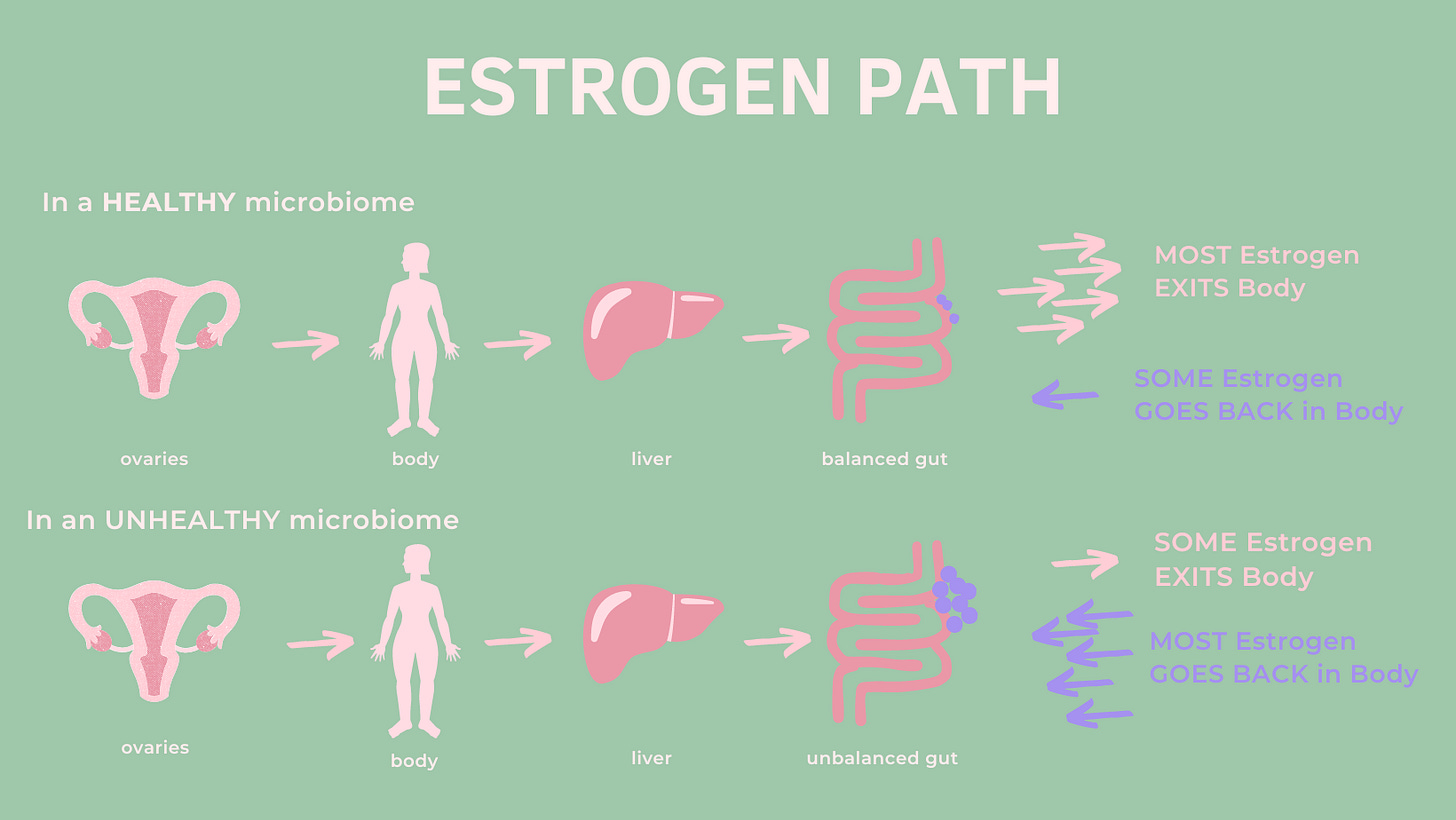Gut Health and Hormonal Balance

I have rewritten the intro for this newsletter many times. Nothing sounded right.
I wanted to introduce this topic by mentioning the research I did on Little M’s digestive issues. Then I thought I should just write that as a nutritionist, I think and talk about digestion almost on a daily basis. I also tried to introduce this topic with the phrase “trust your gut.” Another idea was to open this newsletter with: Did you know that hormones that regulate the menstrual cycle are influenced by the gut?
While the gut impacts many areas of a woman’s health, I will first focus on the relationship between the gut and hormones. The chances are high that I will do a follow-up and write another one on gut and mental health next.
The Foundation
To understand why I think it’s so fascinating, we’ll have to get into the weeds a little bit.
Your intestinal bacteria (and their genes), called the microbiome, process nutrients and aid with digestion. It also releases chemicals that regulate mood, metabolism, and immune function.
Your gut microbiome changes over the course of your life. One of the greatest shifts occurs at a young age, when you first switch from milk to food.
So far so good… but why is gut health especially relevant for women?
Because sex hormones affect gut bacteria and hormone levels change, it makes sense that men's and women's gut microbiomes are different.
One subset of the microbiome, called the estrobolome, is in charge of metabolizing and modulating the body’s circulating hormone estrogen.
Hormones And Gut Health: Why Is Gut Health Important?
Optimizing our gut health is key to keeping our hormones in balance. Gut health is so important because the microbiome has many functions.
It:
- Helps synthesize and regulate hormones and neurotransmitters
- Facilitates the absorption of macro and micronutrients
- It plays an important role in the immune system
- Contributes to the regulation of estrogen levels in the body
The ideal pathway
Estrogen, a female sex hormone, is mainly produced in the ovaries and adrenal glands. They then move to your liver where they’re metabolized and irreversibility irreversibly attached to other compounds. This means that they can’t affect the cells and tissues of your body as they normally would.
Once they’re bound up, they’re sent to your gut and pooped out. In other words, the liver removes them from your bloodstream.

A healthy estrobolome minimizes the amount of estrogen in the gut, allowing safe removal as waste in stool and urine, resulting in healthy estrogen levels.
An unhealthy estrobolome is characterized by an imbalance of gut bacteria (gut dysbiosis). When there is an excess of a certain bacteria, your gut reactivates estrogen and sends it back to the bloodstream.
The result: Too much estrogen, also known as estrogen dominance.
The problem with excess estrogen
Too much estrogen can cause mood imbalances and make periods heavier. It may even be the reason for PCOS, Endometriosis, or even infertility. Some women with excess estrogen levels also report very tender breasts. And if that wasn’t enough already, studies show that too much estrogen can contribute to the development of certain cancers, such as breast cancer, obesity, or metabolic syndrome.
The Bad News:
Unfortunately, gut dysbiosis (an unhealthy gut bacteria balance) is very common and the delicate balance of the microbiome and estrobolome can be affected by many different factors which include genetics, age, weight, diet, alcohol, antibiotics, environmental pollutants and more.
The Good News:
Fortunately, there are ways to improve the health of the microbiome and thus promote a healthy estrobolome.
How to improve hormonal balance through your gut
“The food we eat not only feeds our cells, but also determines what kind of inner garden we are growing in our guts.” – Dr. Mark Hyman

- Eat the rainbow, especially as vegetables.Diet plays a vital role. Foods rich in fiber and polyphenols, such as unprocessed fruits and veggies, promote a healthy microbiome and improve the healthy bacteria diversity.
- Reduce alcohol consumption.While I won’t say anything against the occasional glass of wine, I need to point out that alcohol consumption alters the microbiome. It also influences the liver and its ability to detoxify circulating estrogens and endocrine-disrupting chemicals. All lead to an increased risk of estrogen dominance and certain cancers, such as breast cancer.
- Move your body.
Regular, moderate-intensity exercise can lower levels of circulating estrogens and reduce the stress hormone cortisol, which can negatively impact sex hormones.
I would also say that activities that support the body’s “rest and digest” mode, such as yoga or mindfulness practices, are also very beneficial to hormonal health and balance. - Enjoy pre- and probiotic foods.Prebiotic foods such as garlic, onion, asparagus and bananas provide the material that gut bacteria like to feed on. Probiotic foods such as kefir, kombucha, kimchi, and other fermented foods are really useful for introducing beneficial bacterial strains, like lactobacillus, to the gut. Some studies even recommend the oral supplementation of Lactobacillus acidophilus.
The Takeaway
While our gut is impacted by many things we can’t control, we can still do a lot to support a healthy gut.
Lifestyle, nutrition, physical activity, and stress management can all help balance your estrobolome and ensure that you keep your hormones balanced and optimal.
